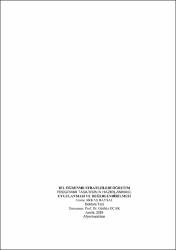Dil öğrenme stratejileri öğretim program tasarısının hazırlanması, uygulanması ve değerlendirilmesi
Abstract
Günümüz dünyasında öğrencilerin yabancı bir dili öğrenmelerini ve başarmalarını etkileyen unsurlar eğitimciler tarafından önemli bir konu olarak görülmektedir. Başarılı olan öğrencilerin nasıl başarılı oldukları ve izledikleri yol ile başarısız olan öğrencilerin başarısızlık nedenlerine ilişkin merak ve ilgi giderek artmaktadır. Öğrencilerin başarı durumlarını ve öğretme-öğrenme ortamlarını önemli ölçüde etkileyen unsurlardan biri de dil öğrenme stratejileridir.
Bu çalışmada ortaöğretim dokuzuncu sınıf öğrencilerine yönelik dil öğrenme stratejileri öğretim programı tasarısının hazırlanması, uygulanması ve değerlendirilmesi amaçlanmaktadır. Yine dil öğrenme stratejileri öğretim programına maruz kalan öğrencilerin İngilizce öz-yeterlik inancı düzeyindeki ve İngilizce akademik başarılarındaki değişimi ortaya çıkarmak çalışmanın bir diğer amacıdır. Çalışma karma yöntem çeşitlerinden açımlayıcı desene göre tasarlanmıştır. Çalışmanın araştırma grubunu 2018-2019 eğitim öğretim yılında Afyonkarahisar Fatih Anadolu Lisesinde öğrenimlerine devam eden toplamda 6 adet dokuzuncu sınıf öğrenci grubu oluşturmaktadır.
Bulgulara göre, öğretim programı uygulanmadan önce deney-1, deney-2 ve kontrol grupta yer alan öğrencilerin dil öğrenme stratejileri kullanım düzeyleri, İngilizce öz-yeterlik inancı düzeyleri ve İngilizce akademik başarı düzeylerinin birbirine çok yakındır. Yedi haftalık uygulama sonrasında yapılan ara değerlendirme testleri ve toplanan nitel veriler, uygulamanın yapıldığı deney-1 grubundaki öğrencilerin dil öğrenme stratejileri, İngilizce öz-yeterlik inancı ve İngilizce akademik başarı düzeylerinin artmaya başladığını göstermektedir. Ara değerlendirme sonrasında deney-2 grubundaki öğrencilere de dil öğrenme stratejileri öğretim programı uygulanmaya başlamıştır. Yedi hafta süren bu uygulama sonrasında, deney-1 grubundaki öğrencilerin diğer gruptaki öğrencilere göre daha fazla strateji kullanma eğiliminde oldukları, İngilizce öz-yeterlik inançlarının ve akademik başarılarının diğer gruplardaki öğrencilere göre daha yüksek olduğu görülmüştür. Deney-2 grubu ve kontrol grubu arasındaki karşılaştırmalar ise deney-2 grubundaki öğrencilerin kontrol grubundaki öğrencilere göre daha fazla strateji kullandıklarını, İngilizce öz-yeterlik inançlarında ve akademik başarılarında pozitif yönde bir artış olduğunu göstermektedir. Ancak deney-1 grubundaki öğrencilerin tüm ortalamaları deney-2 grubuna göre daha yüksektir. Bu durum deney-1 grubundaki öğrencilere deney-2 grubundaki öğrencilerden daha fazla dil öğrenme stratejileri öğretim programının uygulanmasından kaynaklanabilir. In today's world, learning a foreign language has become an obligation beyond necessity. The factors that affect students' learning and achieving a foreign language are seen as an important subject by the educators. There is a growing interest in the reasons for the failure of the students and the success of the students and the way they are successful. Foreign language learning strategies are one of the factors affecting the students' success levels and teaching-learning environments.
In this study, it is aimed to prepare, implement and evaluate the language learning strategies curriculum for the ninth grade students in secondary education. Another aim of this study is to reveal the changes in self-efficacy beliefs and academic achievement of the students who are exposed to the language learning strategies curriculum. In this study, it is designed according to the explanatory pattern of mixed methods. The research group of this study consisted of 6 class who are in ninth grade and attend Afyonkarahisar Fatih Anatolian High School in 2018-2019 academic year.
The findings obtained from the study showed that the levels of language learning strategies, English self-efficacy beliefs and academic achievement were very close to each other before the curriculum was applied. The data obtained from the mid-term evaluation tests and the qualitative data after seven weeks of implementation show that the level of usage of language learning strategies in the experimental-1 group in which the curriculum was performed, the levels of English self-efficacy beliefs and the level of English academic achievement began to increase. However, in this mid-term evaluation, there was no difference in the levels of language learning strategy usage, English self-efficacy levels and English academic achievement levels of the students in the experimental-2 group and in the control group. After the mid-term evaluation, the language learning strategies curriculum was started to be applied to the students in the experimental-2 group. The final tests and qualitative data show that the students in the experimental-1 group tend to use more strategies than the students in the other groups, and that their English self-efficacy beliefs and academic achievement are higher than the students in other groups. The comparisons between the experimental-2 group and the control group show that the students in the experimental-2 group use more strategies than the students in the control group. However, the level of language learning usage, the level of English self-efficacy and academis success of the students in the experimental-1 group were higher than those of the experimental-2 group. This may be due to the fact that the students in the experimental-1 group are exposed to more language learning strategies than the students in the experimental-2 group.



















